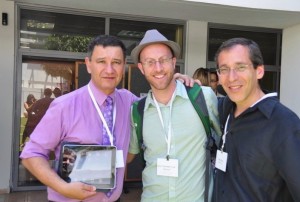
From right to left: me, Benjy Lovitt, Lior Manor and his iPad
A recent episode of the NPR program Science Friday featured an interview with Clifford Nass, the author of the forthcoming book “The Man Who Lied to His Laptop,†about whether human beings are truly able to multitask. His conclusion: not really.
Nass says that we have the illusion of multitasking, but in reality, we are switching from one task to another so quickly it seems like we’re doing more than one thing at once. The problem is that, every time we switch, there is a micro-millisecond delay and that teeny tiny pause causes us to be less productive even when we feel we’re sailing high.
I had a chance to experience the woes of obsessive multitasking first hand earlier this week when I attended the 140 Characters conference in Tel Aviv. The event, produced all over the world – including Israel – by social media and VoIP guru Jeff Pulver, is dedicated to exploring the “real time web†(a fancy way of referring to web and mobile services that let you follow a stream of never ending status updates as they happen).
As I sat in the lecture hall at Tel Aviv’s Afeka College listening to the lectures (which, in true short attention span spirit, were allotted on average no more than 10-15 minutes each), I had my laptop with me open to TweetDeck, a Twitter desktop client where I could follow along as much of the room was “live tweeting†what was happening on stage; Gmail – which I checked incessantly while simultaneously chatting with people both in and outside of the room itself; Facebook – of course (just for fun); an Excel spreadsheet of all the attendees sent by Pulver – so I could scope out who to approach during the networking breaks; a live video stream of the conference itself (with a slight time delay); and Evernote – a application I used to take notes on my laptop which were then automatically synched to my home computer, iPhone and (when I get one) iPad.
And if the lectures ever got boring, I’d brought with me a copy of an article I was working on that needed an edit.
By the time the conference was over, I actually breathed a sigh of relief as I finally caught a break in the long drive back to Jerusalem.
Not so for Michael Matias, a 14-year-old who took the stage for his 10 minutes of fame to tell us about “growing up in real-time.†My multitasking experience is his daily reality. He adds to the mix doing homework while simultaneously watching TV on his laptop (42-inch flat screens are so 2006) and playing online chess and poker. He says he spends at least 5 hours a day online, not including class when he often uses the school computers. When he needs to study, it’s as likely to be via video conference than an in-person cram session.
Matias is a relative pauper when it comes to Facebook friends – he only has 300 and says he only accepts someone he’s met in person. Although he does spend time with people in the so-called “real world,†he told the audience that in some ways he actually prefers his online world. “It brings me closer to them. I can hang out with more than one person at the same time.†No, he doesn’t think he spends too much time online and, when asked which of his real-time tools he’d give up if necessary, he quipped that he couldn’t. “It would be like choosing between my mom and my dad.â€
The rest of the conference was interesting (if less shocking). Israeli comedian Lior Manor did “Twitter magic†– he asked the audience to tweet a number between one and 140 (get it, the 140 character maximum Twitter imposes), then he picked a number from his real-time Twitter stream and did a card trick in person – no different than what magicians have been doing for years except that he used an iPad to display the input.
Yossi Taguri talked about his latest startup Fiidme which lets you “share your satisfaction†about food. “If you’re in a restaurant,†he explained, “you can ask your friends what’s good on the menu and they’ll tweet you their recommendations.†With a grin, he added that they also “thought it would help us get free lunches.†His business partner Lior commented that being in a restaurant “without wireless is very frustrating.†(Whatever happened to the romantic candlelit dinner?)
There was also a session on using Twitter to do good in the world: an Israeli company called JustCoz lets you “donate†your Twitter status to organizations to raise awareness about their causes. In just under a month online, 100 organizations have signed up for the free service, gathering 1,200 supporters which provide re-tweeting access to more than a million people.
Now that’s a great idea from the real time web…if we can actually take a moment away from our incessant multitasking to participate.
Oh, and about that article I was writing? I guess I succeeded because you’re reading it now.
This article was originally posted at Israelity last week immediately following the 140 conference.